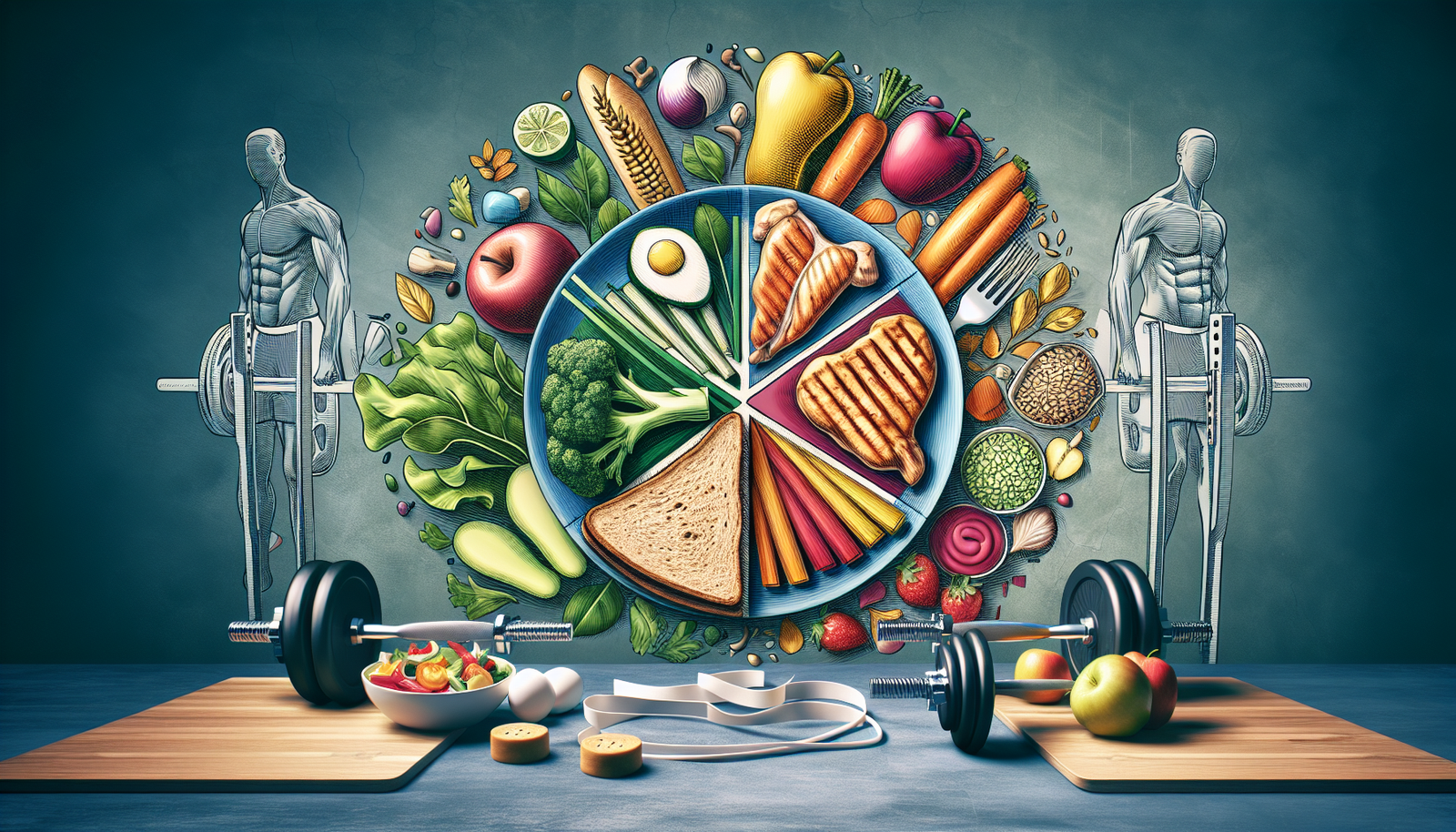Understanding How Much to Eat to Efficiently Build Muscle
Taking the journey towards building muscle can be as exciting as it is intimidating. When it comes to efficient muscle building, knowing how much to eat is equally as crucial as knowing what to eat. In the “Understanding How Much to Eat to Efficiently build muscle” article, you’ll discover how to precisely balance your diet to fuel muscle growth and boost your body’s potential. The article includes commonly asked questions and essential tips to guide you through the tricky path of creating a nutrition plan tailor-made for muscle gain. Buckle up for a journey that will not only sculpt your body but also teach you the nuanced art of eating for strength.

The Science of Building Muscle
Muscle building is a process that involves a lot more than just pumping iron at the gym. There’s science behind this process which helps you understand how it works and get the most out of your efforts.
The role of protein synthesis
Protein synthesis is a vital process responsible for building muscle in your body. When you work out, you create micro-tears in your muscle fibers. Through protein synthesis, your body regenerates these fibers and makes them stronger. Essentially, the rate at which your body can synthesize proteins dictates how quickly you can build muscle.
Understanding muscle hypertrophy
When it comes to muscle growth, the term you need to understand is hypertrophy. Muscle hypertrophy occurs when the fibers of the muscles sustain damage or injury. The body repairs damaged fibers by fusing them, which increases the mass and size of the muscles. This is why you might feel sore after a intense workout – it’s a sign that you’ve initiated the process of hypertrophy.
The importance of balance between muscle protein breakdown (MPB) and muscle protein synthesis (MPS)
Your muscle growth is determined by the balance between muscle protein breakdown (MPB) and muscle protein synthesis (MPS). When the rate of synthesis is greater than the rate of breakdown, you gain muscle. If the rate of breakdown is higher than synthesis, you lose muscle. The better you balance these two processes, through proper workout and nutrition, the more muscle you can pack on.
Understanding Nutrition and Muscle Growth
When it comes to muscle growth, nutrition plays an integral role. You can’t out-train a bad diet. Let’s take a closer look at how nutrition factors into muscle building.
The role of nutrition in muscle building
Good nutrition is like quality fuel for a car. It enables your body to perform optimally, recover faster and, kick-start the process of protein synthesis. Ensuring that you get the right mix of proteins, carbs and fats is crucial for optimum muscle growth.
Importance of proteins, carbohydrates and fats
Proteins, carbohydrates, and fats are essential macronutrients that are crucial for building muscle. Proteins are the building blocks of muscle and are crucial for repair and regeneration of muscle fibers. Carbohydrates provide the requisite energy your body needs to perform high-intensity workouts. Fats are necessary for optimal hormone production, which subsequently impacts muscle growth.
How meal timing affects muscle growth
Meal timing is another crucial aspect of nutrition for muscle growth. Consuming meals in a structured manner around your workout schedule can provide ample fuel for the workouts and also ensure the availability of nutrients necessary for recovery and growth post-workout.

How Much Food Do You Need to Build Muscle?
Understanding your body’s calorie and macronutrient needs is the first step towards creating a diet plan that promotes muscle growth.
Figuring out your daily calorie needs
The number of calories you need can vary based on your age, gender, weight, height, and physical activity level. As a general rule, if you want to build muscle, you need to consume more calories than your body uses.
Calculating your macronutrient requirements
Macronutrients – proteins, carbohydrates and fats – form the major part of your diet. Once you’ve figured out your calorie requirements, the next step is to calculate how to divide those calories among these three macronutrients for optimal muscle growth.
Understanding portion sizes
While the macrocomposition of your diet is crucial, so is understanding portion sizes. Overeating or under-eating, regardless of the macronutrient, can hinder your progress. This is why it’s important to understand portion sizes and make informed decisions about your food intake.
The Role of Proteins in Muscle Building
Protein is a vital component when it comes to muscle growth for reasons we touched upon earlier. Let’s delve deeper into this topic.
How protein contributes to muscle growth
Protein is essential for muscle growth because it helps repair and build muscle tissue. After you workout, your body needs to repair the muscle fibers that were broken down during exercise. Consuming enough protein helps facilitate this process.
Choosing the right sources of protein
Not all protein sources are created equal. Some sources provide a complete set of amino acids (the building blocks of protein), while others do not. Animal proteins, like meat, fish, and eggs, are complete protein sources. Vegetarian sources can include legumes, grains, and plant-based protein powders.
Determining your daily protein requirement
Your protein requirements can vary based on several factors. However, a common benchmark is to consume 1 gram of protein per pound of your body weight. This is a good starting point, but you can adjust as needed based on your diet and workout regimen.

The Importance of Carbohydrates for Energy and Recovery
While protein often takes the spotlight in discussions about muscle building, carbohydrates play an equally important role.
Understanding the role of carbohydrates
Carbohydrates fuel your workouts. The more intense your workout, the more carbohydrates your body uses. Post-workout, carbs replenish depleted glycogen stores, helping your body recover and prepare for the next workout.
Choosing the right types of carbohydrates
There are two primary types of carbohydrates – simple and complex. While simple carbs are digested quickly and cause a rapid spike in energy, complex carbs are digested slowly, providing sustainable energy. For muscle building, it’s crucial to include more complex carbs like whole grains, fruits, and vegetables in your diet.
Determining your daily carbohydrate intake
As a general guideline, aim to make carbs approximately 45-65% of your total calorie intake. This can vary based on your personal goals, lifestyle, and overall diet.
Understanding the role of Fats in Muscle Growth
Though often vilified, dietary fat plays an integral role in muscle growth.
The importance of dietary fat in hormone production
Dietary fat is essential for optimizing hormone production, particularly testosterone, which plays a crucial role in muscle growth. This doesn’t mean overindulging in fatty foods, but rather incorporating healthy fats into your diet.
Choosing the right types of fats
Not all fats are created equal. Trans fats and certain saturated fats can harm your health, while monounsaturated and polyunsaturated fats, found in foods like fish, nuts, and certain oils, can support both general health and muscle growth.
Knowing your daily fat requirement
Fats should comprise around 20-35% of your daily caloric intake. Like with other macronutrients, the quality of the source matters.

Meal Timing for Muscle Growth
Meal timing is a tactical approach to eating that synchronizes your nutrition with your metabolic cycle, enhancing your body’s efficiency to utilize nutrients.
How meal timing affects protein synthesis
When you consume proteins pre and post-workout, it aids in increasing muscle protein synthesis rate, promoting muscle growth, and reducing muscle protein breakdown.
Post-workout nutrition for muscle growth
After a workout, there’s a window of opportunity when your muscles are primed to accept nutrients that can trigger muscle repair and growth. A post-workout meal of proteins and carbohydrates aids in muscle recovery and growth.
Pre-sleep nutrition for muscle recovery
Before sleeping, a protein-rich meal can be beneficial because it provides your body with the necessary nutrients to repair and build muscles overnight.
Hydration and Muscle Growth
Hydration has a significant role in muscle health and recovery. Without adequate hydration, your muscle-building efforts can be severely compromised.
The role of hydration in muscle health
Adequate water intake is necessary for optimizing physical performance and aiding in the transport of nutrients to your muscles. Hydrating also assists in preventing muscle cramps and lubricating your joints, making your workouts safer and more effective.
How much water you should drink for muscle growth
While the “8 cups a day” rule is well-known, the amount can vary based on individual needs and physical activity intensity. A good rule of thumb is to drink at least half your body weight (in pounds) in ounces of water each day.
Effects of dehydration on muscle performance
Dehydration can have a significant impact on muscle performance, causing fatigue, and reducing endurance. Moreover, severe dehydration can impair strength, power, and muscle-building potential.

Supplements for Muscle Growth
While a balanced diet remains of utmost importance, supplements can provide added benefits when it comes to muscle growth.
Understanding the role of supplements in muscle building
Supplements are not magic pills for muscle growth, but they can support your diet and workout regimen. Certain supplements can enhance recovery, promote muscle growth, and improve performance.
Choosing the right muscle building supplements
When it comes to muscle growth, creatine, protein powders, Omega-3 fatty acids, and BCAAs are often recommended. Always choose quality supplements and remember, supplements are meant to ‘supplement’ a balanced diet, not replace it.
Safely using muscle building supplements
It’s always advisable to use supplements as per the instructions on the label or as per your dietitian’s advice. Over-reliance or misuse of supplements can have negative impacts on the health.
Frequently Asked Questions About Muscle Building Nutrition
Best protein sources
Animal sources like chicken, turkey, eggs, fish, lean beef, and dairy products are excellent protein sources. For vegetarians or vegans, chickpeas, lentils, tofu, quinoa, and plant-based protein powders are good options.
How much to eat to gain muscle
The quantity of food required for muscle growth can vary from person to person, but it generally revolves around consuming more calories than your body uses. Alongside increased calorie intake, a balance of proteins, carbohydrates, and fats is essential.
Optimal meal time for muscle growth
While meal timing can depend on individual routines, it’s generally beneficial to spread meals across the day, with ample servings of proteins and carbohydrates pre and post-workout.
Difference between bulking and cutting diet
A bulking diet focuses on creating a calorie surplus to build muscle, with a high protein intake and substantial carbohydrate and fat intake. A cutting diet aims to lose fat while preserving muscle, typically through a moderate protein, lower carbohydrate, and lower fat diet.
Do I need to take supplements to build muscle?
Supplements can aid in muscle building, but they’re not essential. You can build muscle with a well-balanced diet rich in proteins, carbohydrates, and fats. If you find it hard to suffice your nutrient needs through food alone, then supplements can be a useful aid. Always consult a healthcare professional or dietitian before starting any supplement regimen.


Pingback: Understanding How Much Protein is Required to Build Muscle Mass – Lose Weight With Absolute Minimal Diet – Your All In One Guide to Weight Loss & Nutrition